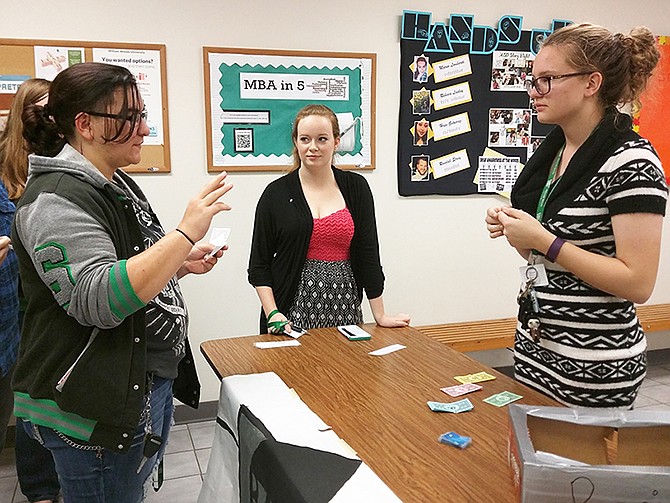The students bustled to and fro, withdrawing (play) cash, picking up "headache medicine" (actually Skittles) and checking out books. Fingers flutter and money changes hands, but nobody says a word.
Welcome to Deaftropolis.
"Many of the students who come don't know ASL (American Sign Language) at all," said Maria Lombardi, president of the Hands Up! club at William Woods University.
This student club arranged the Deaftropolis event, which is in its third year. Hands Up! is run by the interpreting department. It's a group where students with any level of knowledge about signing can learn ASL and get involved in the local deaf community.
"At my first college, I decided to do something a little different in my life, and then I saw William Woods had the Hands Up! club and I joined," club secretary Hope Gutierrez said.
Deaftropolis is a simulation of the experience of being deaf - but with the roles switched. Hearing students get a list of tasks to complete, such as withdrawing money from the "bank," and go from table to table trying to complete these tasks without speaking.
"There are deaf faculty and community members that volunteer to come," Lombardi said.
These volunteers man the tables. Some students know at least a little ASL and breeze through the challenges. Others, not so much.
"I know 'hi' and 'thank you,'" said Stefan Simic. "I went to Deaftropolis last year and thought it was pretty fun. It's really different. It makes you think."
This year, he brought two of his friends along.
"If it's something I can express with my body without saying anything, I do," Simic said, explaining his method of communication. "Otherwise, I just point."
The experience is designed to be a little frustrating for students who know little to no ASL.
"It gives the hearing a chance to work harder to be understood, like deaf people do," said Grace Herbek, the Hands Up! club member running the bank.
Most of the people a deaf individual interacts with on a day-to-day basis do not know ASL, making communication difficult.
"It's like walking in someone else's shoes for the day," Gutierrez said.

